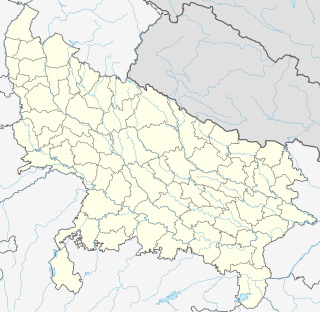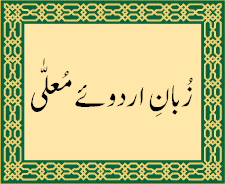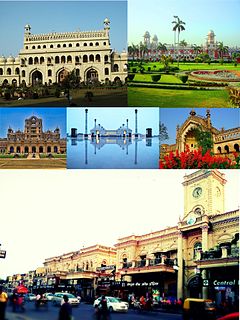Khwaja Ahmad Abbas, popularly known as K. A. Abbas, was an Indian film director, screenwriter, novelist, and a journalist in the Urdu, Hindi and English languages. He won four National Film Awards in India, and internationally his films won the Palme d'Or at the Cannes Film Festival and the Crystal Globe at the Karlovy Vary International Film Festival. As a director and screenwriter, Khwaja Ahmad Abbas is considered one of the pioneers of Indian parallel or neo-realistic cinema, and as a screenwriter he is also known for writing Raj Kapoor's best films.

Urdu —or, more precisely, Modern Standard Urdu—is a Persianised standard register of the Hindustani language. It is the official national language and lingua franca of Pakistan. In India, it is one of the 22 official languages recognized in the Constitution of India, having official status in the six states of Jammu and Kashmir, Telangana, Uttar Pradesh, Bihar, Jharkhand and West Bengal, as well as the national capital territory of Delhi. It is a registered regional language of Nepal.

The Babri Masjid was a mosque in Ayodhya, India. Located in Faizabad district, it was one of the largest mosques in the Uttar Pradesh state. Before the 1940s, the masjid was officially known as Masjid-i-Janmasthan. According to the mosque's inscriptions, it was built in 1528–29 by Mir Baqi, on orders of the Mughal emperor Babur.

Sita Ram Goel was an Indian religious and political activist, writer, and publisher in the late twentieth century. He had Marxist leanings during the 1940s, but later became an outspoken anti-communist and also wrote extensively on the damage to Indian culture and heritage wrought by expansionist Islam and missionary activities of Christianity. In his later career he emerged as a commentator on Indian politics, and adhered to Hindu nationalism.
Samkhya or Sankhya is one of the six āstika schools of Hindu philosophy. It is most related to the Yoga school of Hinduism, and it was influential on other schools of Indian philosophy. Sāmkhya is an enumerationist philosophy whose epistemology accepts three of six pramanas (proofs) as the only reliable means of gaining knowledge. These include pratyakṣa (perception), anumāṇa (inference) and śabda. Sometimes described as one of the rationalist schools of Indian philosophy, this ancient school's reliance on reason was exclusive but strong.

Hindustan is the Persian name for India, broadly the Indian subcontinent, which later became an endonym used in Hindi-Urdu. After the Partition of India, it continues to be used as a historic name for the Republic of India.

Ram Janmabhoomi is the name given to the site that is the birthplace of Rama, the 7th avatar of the Hindu deity Vishnu. The Ramayana states that the location of Rama's birthplace is on the banks of the Sarayu river in a city called "Ayodhya". A section of Hindus claim that the exact site of Rama's birthplace is where the Babri Masjid once stood in the present-day Ayodhya, Uttar Pradesh. According to this theory, the Mughals demolished a Hindu shrine that marked the spot, and constructed a mosque in its place. People opposed to this theory state that such claims arose only in the 18th century, and that there is no evidence for the spot being the birthplace of Rama.
Guṇa depending on the context means "string, thread, or strand", or "virtue, merit, excellence", or "quality, peculiarity, attribute, property".
Prakriti or Prakruti, means "nature". It is a key concept in Hinduism, formulated by its Samkhya school, and refers to the primal matter with three different innate qualities (Guṇas) whose equilibrium is the basis of all observed empirical reality. Prakriti, in this school, contrasts with Purusha which is pure awareness and metaphysical consciousness. The term is also found in the texts of other Indian religions such as Jainism, and Buddhism.
Vidyaranya is variously known as a kingmaker, patron saint and high priest to Harihara I and Bukka Raya I, the founders of the Vijayanagara Empire. He was the 12th Jagadguru of the Śringeri Śarada Pītham from 1380-1386.

Azamgarh district is one of the three districts of Azamgarh division in the Indian state of Uttar Pradesh.

The Hindi–Urdu controversy is an ongoing dispute—dating back to the 19th century—regarding the status of Hindi and Urdu as a single language, Hindustani, or as two dialects of a single language, and the establishment of a single standard language in certain areas of North India. Although this debate was officially settled in India by a government order in 1950, declaring Hindi as the official language, some resistance remains. The present notion among some Muslims about this dispute is that Hindus abandoned the Urdu language, whereas some Hindus claim that Urdu was artificially created during Muslim rule.
The Ayodhya dispute is a political, historical and socio-religious debate in India, centred on a plot of land in the city of Ayodhya, located in Ayodhya District, Uttar Pradesh. The main issues revolve around access to a site traditionally regarded among Hindus to be the birthplace of the Hindu deity Rama, the history and location of the Babri Masjid at the site, and whether a previous Hindu temple was demolished or modified to create the mosque.
The Scientific Society of Aligarh was founded by Sir Syed Ahmed Khan in 1864. In 1862 Syed formed a Translation Society which used to translate the scientific books of English and other European languages into Urdu and Hindi. This society later evolved into the Scientific Society of Aligarh. The society sought to promote liberal, modern education and Western scientific knowledge in the Muslim community in India.

The Urdu movement was a socio-political movement aimed at making Urdu the universal language and symbol of the cultural and political identity of the Muslim communities of the South Asia during the British Raj. The movement began with the fall of the Mughal Empire in the mid-19th century, fuelled by the Aligarh Movement of Sir Syed Ahmed Khan. It strongly influenced the All India Muslim League and the Pakistan movement.

Vibhuti Narain Rai is a police officer and author from India. He obtained an M.A. in English literature from Allahabad University in 1971 and joined the Indian Police Service in 1975 as a part of the Uttar Pradesh cadre. He served many sensitive districts as a superintendent of police.

Sir Muhammad Iqbal, widely known as Allama Iqbal was an Indian poet, philosopher and politician, as well as an academic, barrister and scholar in British India who is widely regarded as having inspired the Pakistan Movement. He is called the "Spiritual Father of Pakistan." He is considered one of the most important figures in Urdu literature, with literary work in both Urdu and Persian.

Muhammed Akhtar Raza Khan Azhari was an Indian Barelvi Muslim scholar and mufti. He was a descendant (great-grandson) of Mujaddid Ahmed Raza Khan, founder of the Barelvi movement. He was considered by Barelvi Muslims in India to function as the Grand Mufti of India. He had been ranked 22nd on the list of The 500 Most Influential Muslims in the world, compiled by the Royal Islamic Strategic Studies Centre. He had crores of followers across the country and outside. On 20 July 2018, he died from a long illness.

Faculty of Arts is one of the faculties of Aligarh Muslim University comprising 10 departments. The faculty of Arts offers a number of courses in different language courses in the respective departments. The faculty is situated on the opposite side of Maulana Azad Library.
Ale Ahmad Suroor was an Urdu poet, critic and professor from India. He is best known for his literary criticism. In 1974 he was honoured with the Sahitya Akademi Award by the Government of India for his literary critic work, Nazar aur Nazariya. In 1991 he was also awarded the Padma Bhushan, India's third highest civilian award. He was awarded a special gold medal by the President of Pakistan on the centenary of the birth of Muhammad Iqbal.















